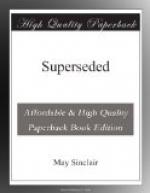But Juliana, toiling from morning till night for her eighty pounds a year; Juliana, painful and persistent, growing into middle-age without a hope, Juliana was an incarnate reproach, a perpetual monument to the folly of Tollington Moon. Juliana disturbed her dream.
But nobody else disturbed it, for nobody ever came to their half of the house in Camden Street North. Louisa used to come and go in a brief perfunctory manner; but Louisa had married the Greek professor and gone away for good, and her friends at St. Sidwell’s were not likely to waste their time in cultivating Juliana and Mrs. Moon. The thing had been tried by one or two of the younger teachers who went in for all-round self-development and were getting up the minor virtues. But they had met with no encouragement and they had ceased to come. Then nobody came; not even the doctor or the clergyman. The two ladies were of one mind on that point; it was convenient for them to ignore their trifling ailments, spiritual or bodily. And as soon as they saw that the world renounced them they adopted a lofty tone and said to each other that they had renounced the world. For they were proud, Mrs. Moon especially so. Tollington Moon had married slightly, ever so slightly beneath him, the Moons again marking a faint descent from the standing of the Quinceys. But the old lady had completely identified herself, not only with the Moons, but with the higher branch, which she always spoke of as “my family.” In fact she had worn her connection with the Quinceys as a feather in her cap so long that the feather had grown, as it were, into an entire bird of paradise. And once a bird of paradise, always a bird of paradise, though it had turned on the world a somewhat dilapidated tail.
So the two lived on together; so they had always lived. Mrs. Moon was an old woman before she was five-and-fifty; and before she was five-and-twenty Juliana’s youth had withered away in the sour and sordid atmosphere born of perishing gentility and acrid personal remark. And their household gods looked down on them, miniatures and silhouettes of Moons and Quinceys, calm and somewhat contemptuous presences. From the post of honour above the mantelshelf, Tollington, attired as an Early Victorian dandy, splendid in velvet waistcoat, scarf and chain-pin, leaned on a broken column symbolical of his fortunes, and smiled genially on the ruin he had made.




